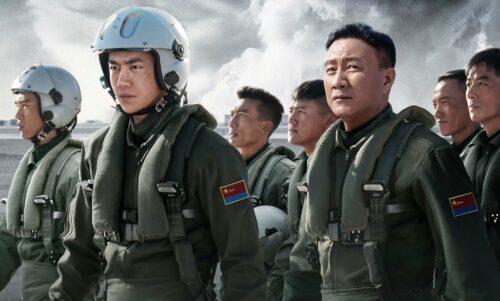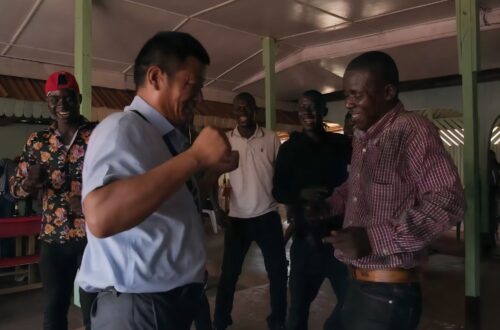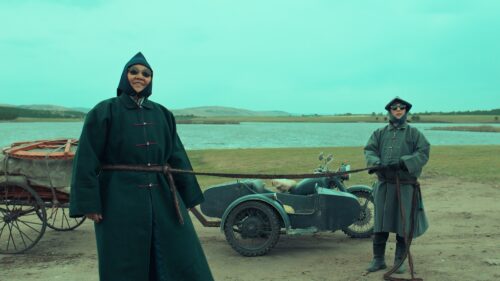‘Only the River Flows’: China’s brightest up-and-coming director gets a mainstream release
Remember the name: Wei Shujun.

Only the River Flows, a stylish detective story set in 1990s China, won a Best Film award at the Pingyao International Film Festival that concluded on October 18. This was after it had its U.S. premiere at the Chicago International Film Festival on October 14. It then got a large domestic theatrical release, on October 21, and raked in a healthy 146 million yuan ($20 million) on opening weekend.
Not bad for an arthouse film.
Only the River Flows is the third full-length feature directed by 32-year-old Wèi Shūjūn 魏书钧, whose three films — Striding into the Wind (2020) and Ripples of Life (2021), previously — have all shown at Cannes. Wei has earned himself quite the reputation, hailed as “the future of Chinese cinema.” But Only the River Flows marks an especially bold move: It is an adaptation of a short story by one of the most revered Chinese writers, Yú Huá 余华, with Wei taking a bigger leap forward than in his previous projects. He abandons the linear plot for the sake of mentalscapes, and plays with details and structures that resist easy framing.
The film centers on Ma Zhe, a detective in a small town in southern China in 1995. Ma’s professional and private life seems complete. He solves cases smoothly and returns home to a wife who is expecting a child. One evening, he is called to a crime scene by the river, where the body of an older woman has been found. At first, he approaches the murder case with an air of a routine. Soon, other murders by the riverbank follow. Ma Zhe’s reliance on reasoning and logic is put to a test — from which he might not be able to recover.
The film goes far beyond the scope of classic literary adaptation. This characterizes Wei Shujun himself — he craves challenges and is not afraid to reinvent himself each time he takes up a new project.
A rapper-turned-filmmaker, Wei studied sound recording at China Communication University. He gained practical experience running a company, making commercials and organizing parties. It prepared him for the hectic realities of the Chinese film industry, in which the ability to make use of the constantly changing environment is key to getting things done.
All told, Wei was able to preserve the paranoia present in Yu Hua’s writing. He accomplishes it through the careful construction of cinematic space. The film starts with a scene of kids playing cops and robbers in an abandoned building. The boy playing a policeman loses track of the others; he keeps opening different doors, and suddenly, appearing behind one of them is nothing but a precipice, revealing that the building is gradually being torn down.
The filmmaker adds many subplots and details that do not appear in Yu Hua’s short story but make the storytelling palpably cinematic and metaphorical. One such detail is the chief of police’s idea to move the entire crime department to an abandoned cinema theater. Ma Zhe’s office is in the projection booth — the space as small, dark, and claustrophobic as the insides of the protagonist’s brain. He spends days projecting photos from the crime scene onto the wall of what used to be the projection booth, going deeper and deeper into thought spirals. Wei’s storytelling technique is playfully multi-layered, resulting in an in-depth reflection on the nature of delusions and mechanisms of cognition.
In the short story as well as its adaptation, we see the killer early on. But much like Ma Zhe himself, we refuse to accept it because not only does it go against the rules of the genre, but also disturbs the mechanisms of audience identification with the protagonist. In the scene of the first murder, the weapon emerges from behind the camera, as if the audience is the killer — turning the viewer into an unwitting accomplice. The knowledge of the world on screen is limited to the viewfinder of the camera, and no theories of realism will offer any consolation.
Wei loves mind games and paradoxes, but it remains to be seen if this level of playfulness will be accepted by audiences in China. At the recently concluded 7th Pingyao International Film Festival, young Chinese arthouse filmmakers discussed how contemporary audiences in China want closed endings and clear resolutions. Wei Shujun offers one, but fully with tongue in cheek.
However, supported by the star power of Zhū Yīlóng 朱一龙 playing Ma Zhe and Yu Hua himself claiming to be Wei Shujun’s fan, Only the River Flows has a chance to change perceptions of arthouse cinema in China, possibly helping secure future arthouse films bigger theatrical releases.







